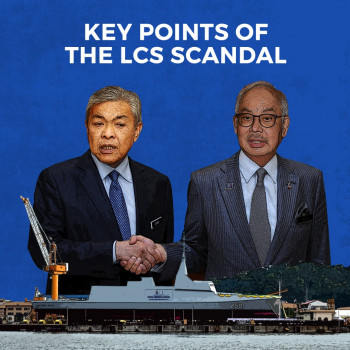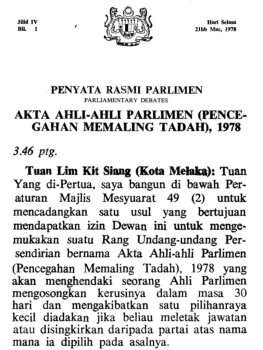The Barisan Nasional government must either be clairvoyant, or in denial.
Its 5% – 6% growth projection for 2012 is, politely put, over-optimistic. Put side by side with a list of financial institutions’ cautious figures, the discrepancy is stunning.
RHB Research Instutute forecasts a mere 3.5% and Maybank Investment Bank expects 3.5% to 4% growth. CIMB Investment Bank predicts 3.8%, while Goldman Sachs, Bank of America, and MIER have projected GDP growth of 4.2- 4.5%.
Meanwhile, the BN government is assuming a rosy 5% – 6% growth, a feat which would require miraculous 5.7% economic growth in the second half of the year.
Malaysia’s projected growth forecast for 2012
| RHB Research Institute
Maybank Investment Bank CIMB Investment Bank Goldman Sachs Bank of America Global Research Malaysian Institute of Economic Research |
3.5%
3.5% – 4% 3.8% 4.2% 4.2% 4.5% |
| Malaysian Federal Government | 5 -6% |
What’s the big deal with 1% or 2%, you ask? According to political researcher Ong Kian Ming, that 1% can make a world of difference. 1% of Malaysia’s GDP last year is as much as RM7.66 billion.
Ong explains that if nominal GDP growth rates for 2012 were cut by 1%, it could increase the government’s deficit to 5.3% – 5.6% from the 4.7% announced. This can easily increase to beyond 6% if a supplementary budget is passed.
A supplementary budget look highly likely, as the BN trend of under-budgeting and over-spending has been well established for the past two decades. Bandar Kuching MP Chong Chieng Jen points out that the actual deficit of the Government for the period from 1998 till 2010 exceeded the budgeted deficit by a whopping 54.28%!
The government budgets its expenditure based on how much money it expects to have in its coffers. If its predictions are off the mark, then we could end up spending much more than we can actually afford.
Skyrocketing government expenditure contrasted with modest income growth is a surefire recipe for disaster. As PEMANDU CEO Senator Idris Jala famously pointed out, government debt has been growing consistently by 12% annually, leading Malaysia on the path to bankruptcy.
CPI’s Dr Lim Teck Ghee notes that if this trend continues, we will reach a point where government revenue will not be enough to service its debt and to operate the hospitals, schools and other government services. In other words, the country will go into sovereign debt crisis, which is a polite way of saying that the country will become bankrupt.
Unrealistic growth projection
 Like an ostrich with its head in the ground, Putrajaya has defended its growth projection of 5% – 6% for 2012 as reasonable. Deputy Finance Minister Datuk Awang Adek Hussin reportedly said that the government “has its own reasons” for the high projection, despite the global economic slowdown.
Like an ostrich with its head in the ground, Putrajaya has defended its growth projection of 5% – 6% for 2012 as reasonable. Deputy Finance Minister Datuk Awang Adek Hussin reportedly said that the government “has its own reasons” for the high projection, despite the global economic slowdown.
It is difficult to see how Malaysia would be immune to the worldwide economic climate, given that our country exports 53% of what we produce annually. One would expect heavy reliance on exports to leave Malaysia vulnerable in a gloomy economic outlook.
Our GDP would be affected by economic conditions in countries that trade with us the most. In 2011 our top trading partners were China, Singapore, Japan, European Union, and United States.
Looking around, China’s imports have been hurt as the Eurozone crisis deepens, and Singapore’s growth rates too are affected by the European economic downturn. Greece’s fate hangs in the balance, while the recent US’s credit rating downgrade are symptoms of a sluggish global economy.
All around us countries are facing a financial meltdown in confidence and the risk of a global recession looms ahead. This could trigger heavy repercussions in Malaysia, whether or not the government is prepared to admit it.
In light of global economic conditions, the budget should focus on helping ordinary Malaysians deal with the impending slowdown. Failing to provide for citizens in the event of a recession is an epic failure of a so-called “welfare budget”. –The Rocket.
HEY BIG SPENDER, THAT’S OUR MONEY!
A bankrupt uses his wife’s credit card to buy them a holiday, hoping for a gambling win to pay her back. Should she be happy with this act of ‘generosity’?
BN’s budget seems to be spending future cash (see Bankrupt by 2020 story). This appears to be money the country doesn’t have now – and probably can’t afford in the future. Yet, the government expects you to be grateful because it is giving you back some of your money, in the form of goodies.
Paltry handouts to the rakyat shouldn’t distract from the fact that Najib has just chalked up the highest Federal Government debt in history.
This follows 13 consecutive years of budget deficit. Government debt now stands at 53.8% of GDP. That’s a staggering RM456 billion worth of debt, a mind-boggling figure with nine zeros behind it!
With such a massive debt, the government has no choice but to shift the burden of repaying it to the rakyat. Taxation measures are inevitable as can been seen from the recent service tax increase to 6%, as well as the much-talked-about GST increase which will likely be implemented post GE-13.
The government expects to receive RM135.6 billion in taxes in 2012, which will account for almost 70% of its revenue intended to cover the budget deficit. However, the global economic crisis could very well cause declining profits and reduce the government’s tax revenue.
Meanwhile, government contracts and commitments pile up, despite money not coming in. It is likely that the deficit will spiral to higher levels, possibly surpassing the figure stated in the budget.
How then will BN foot the hefty bill for its over-ambitious expenditure?
IT’S NOT BN’S MONEY!
 When announcing budget 2012, PM Najib beamed with pride as the handouts announced caused gleeful applause. Why does the government expect us to thank them for spending our money? It is a bit like thanking a toll booth operator for receiving the toll you’re paying.
When announcing budget 2012, PM Najib beamed with pride as the handouts announced caused gleeful applause. Why does the government expect us to thank them for spending our money? It is a bit like thanking a toll booth operator for receiving the toll you’re paying.
Back to Najib. The RM232.8 billion budget is government funds which rightfully belong to the people. One should not easily forget that the government of the day is only a caretaker of public funds. It has no right to spend public funds to benefit its political party.
All government expenditure flows from the duty of a government towards all citizens. Expenditure of government funds is passed by Parliament after debate from all MPs, regardless of which political party is ruling.
It is therefore reprehensible for public funds to be spent as election funds. That would be vote buying.
Essentially, the Malaysian situation has become one where public funds are spent as if it were the sole possession of a political party campaigning for reelection. BN’s political benefit should not be a consideration in budget allocation, nor should the voter’s support.
Expenditure should be channeled directly to the target groups transparently, contracts should be awarded via open tender.
Anything else would be throwing public funds down a black hole of mismanagement and questionable motives.
After all, the toll booth operator isn’t supposed to pocket the money. –The Rocket.



